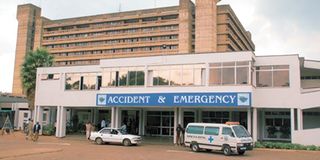Alarm as truant doctors abandon patients at KNH

Senior doctors at Kenyatta National Hospital spend much of their time in their personal clinics or private hospitals. Photo/FILE
What you need to know:
- Consultants sign-in in the morning and head to work elsewhere, leaving the sick under the care of trainees, says nurse
Senior doctors at Kenyatta National Hospital spend much of their time in their personal clinics or private hospitals, leaving patients under the care of trainees.
The disturbing revelations are contained in taskforce report submitted to the hospital in March and which has not been made public.
The students, also known as registrars, are junior doctors pursuing specialisation degrees in various fields, who usually require close supervision from the senior doctors, popularly known as consultants, to help them hone their skills.
But the senior doctors seem to be away from the hospital and their students most of the time and the report notes that there is “inadequate supervision and mentorship (of registrars) by consultants and lecturers.”
The report, prepared by a taskforce formed by the hospital and the College of Health Sciences at the University of Nairobi, is indeed, a confirmation that doctors abscond duty at KNH.
One registrar, who requested anonymity for fear of victimisation, said: “Sometimes the consultants will allow you to go ahead and do an operation on a patient without supervision, yet such a procedure requires him or her to be there to guide and teach you.”
What makes matters worse is the requirement by the University of Nairobi that a student must have done a given number of tasks for them to graduate. For instance, a student must perform a set number of surgical operations.
Therefore, desperate registrars are going ahead to perform the procedures without the supervision of the consultants.
And some of the senior doctors confirmed that this was a serious issue. “It is a pity. I have witnessed consultants allowing the registrars to even teach students at the School of Medicine on areas that require senior doctors to do so,” said one of the doctors, who supported the findings and recommendations of the task force.
“It is about failure to respect ethics and values that guide this profession,” another doctor added.
At the KNH cancer unit, for instance, nurses said the senior doctors usually report in the morning, sign that they are in, then leave to work somewhere else.
“The rate at which patients are seen could be higher if all the senior doctors were present,” one of the nurses in the unit said.
Another doctor summed up the absence of the consultants from the hospital as “lack of discipline and bad manners.”
The task force report is categorical that the consultants are ultimately responsible for the patients.
Says the report: “In order to maximise patient safety and educational opportunities, the clinical faculty will be available during clinics, major ward rounds and admission rounds to provide guidance and meaning to the student’s experience.”
“Newly admitted patients will be reviewed within 24 hours of admission by the consultant.”
But sources within the hospital say not much has changed since the release of the report.
And the recent demands by registrars for better pay and good working conditions partly stem from being overloaded with patient care.
It is understood that the consultants have continued to resist any attempts to rein them in, with senior managers taking a softer approach for fear of angering them.
One of the doctors said the money they earn at KNH is too little to sustain their families, hence the need to spend time in their private clinics or in private hospitals.
Indeed, the report acknowledges the poor pay of doctors and recommends the establishment of a Health Service Commission to look into the issue.
The other issue raised by the report was how the large numbers of students admitted by the University of Nairobi had overstretched facilities at KNH.
The junior doctors complained that inadequate facilities, overcrowded and under-equipped consultation rooms made it difficult for them to receive quality training and offer high standards of care to patients.
According to the report, the government needs to decongest KNH by establishing satellite training centres.




